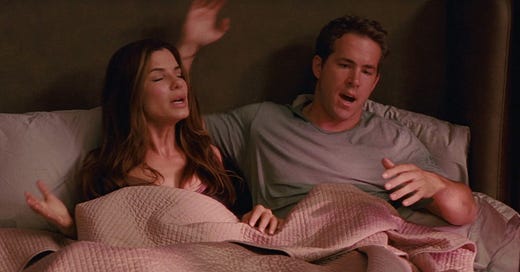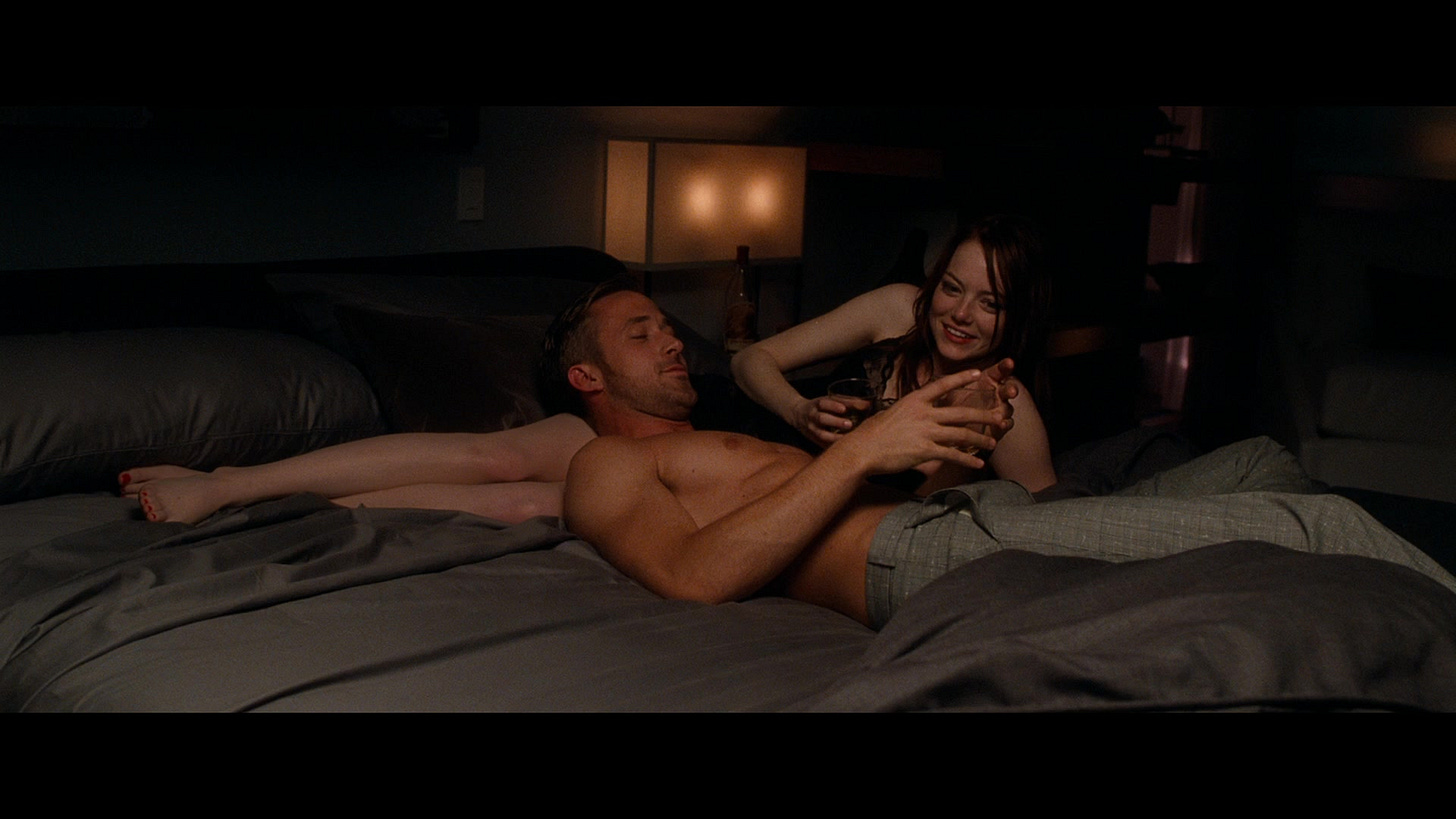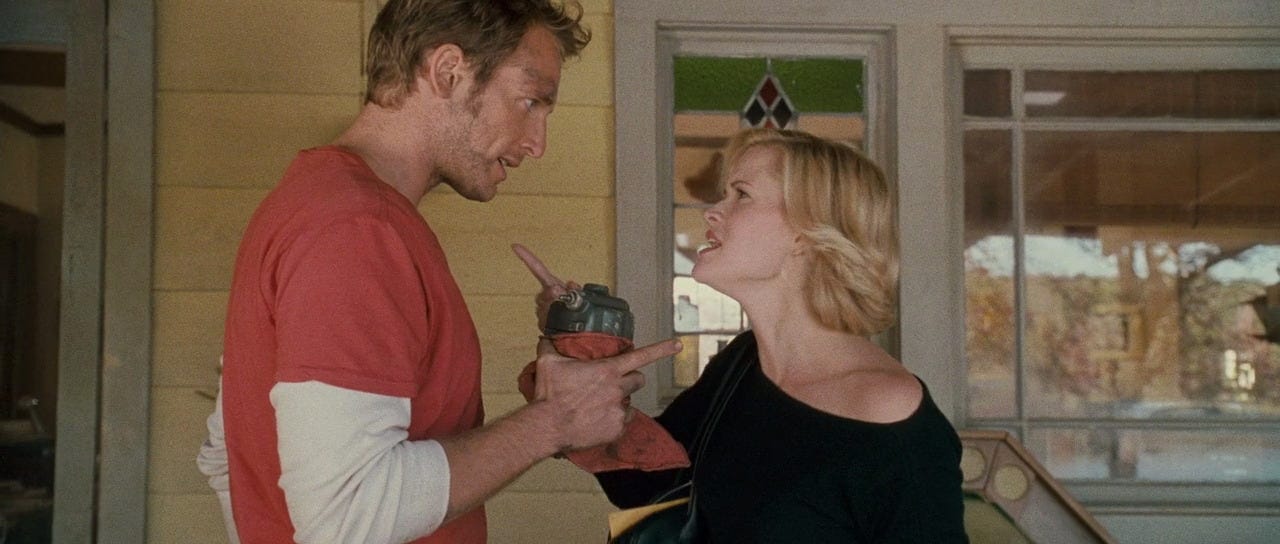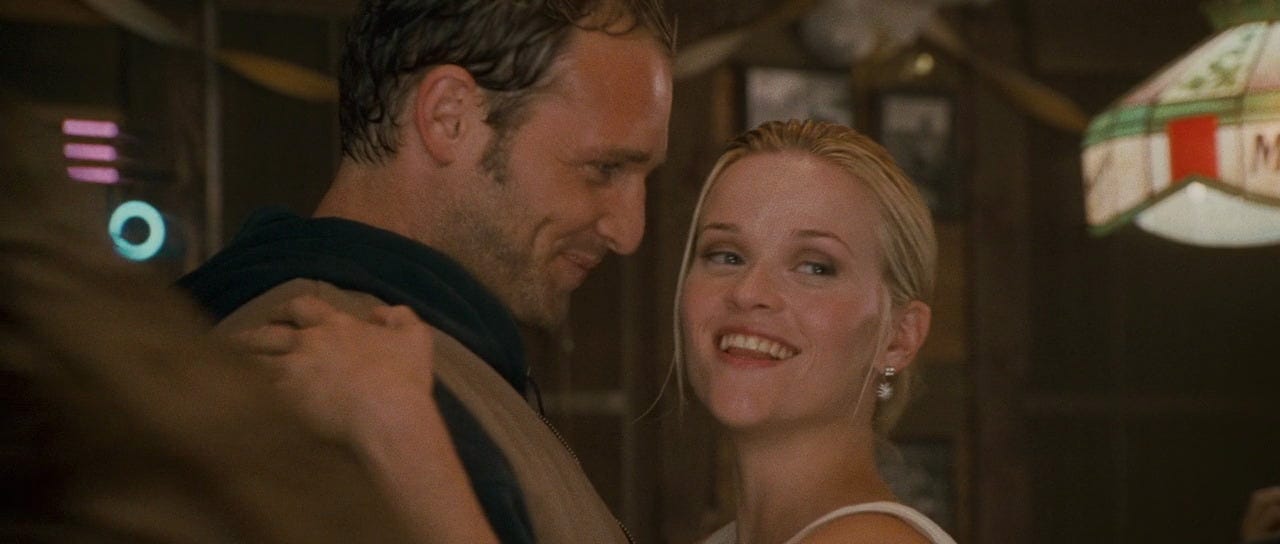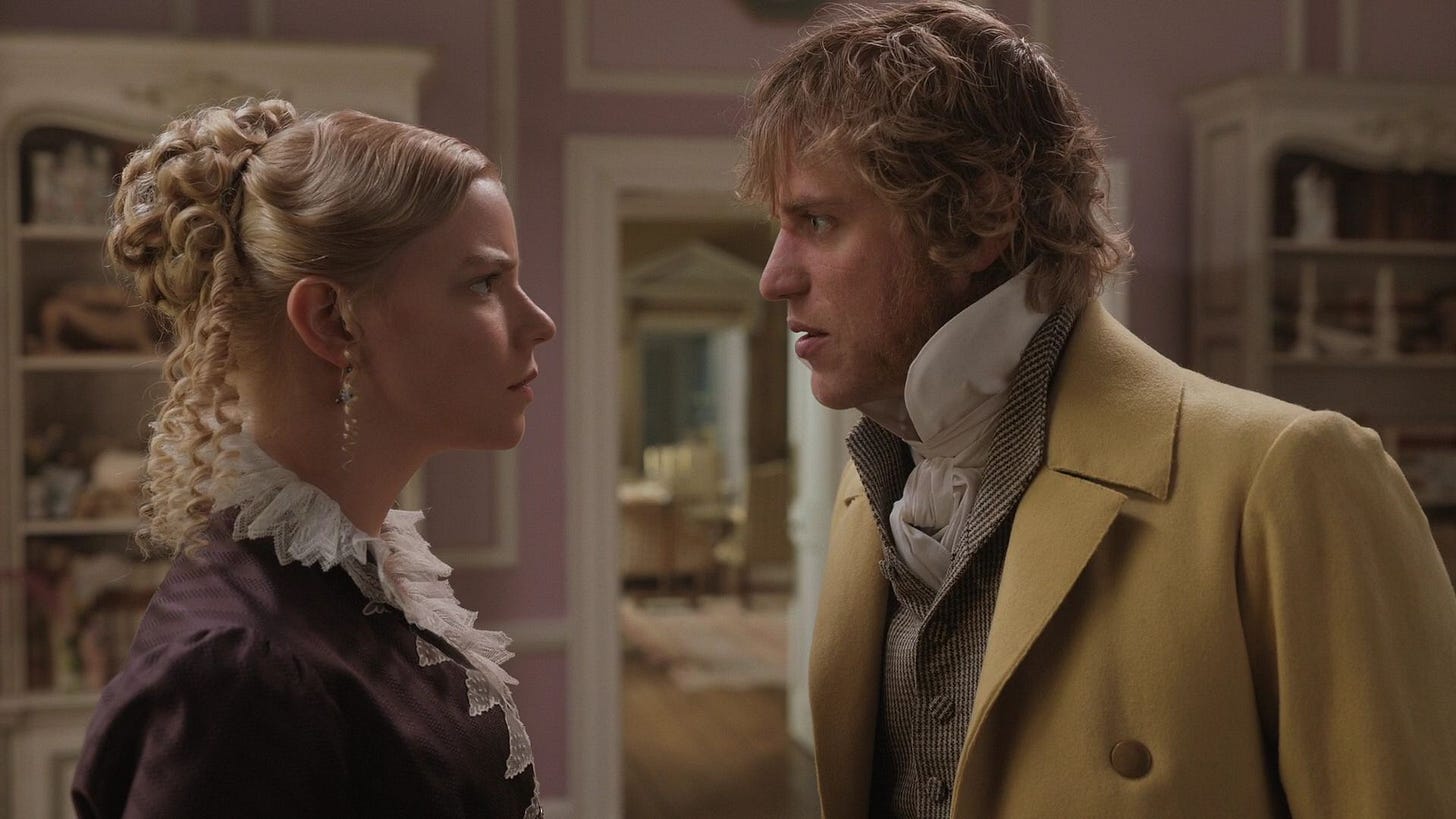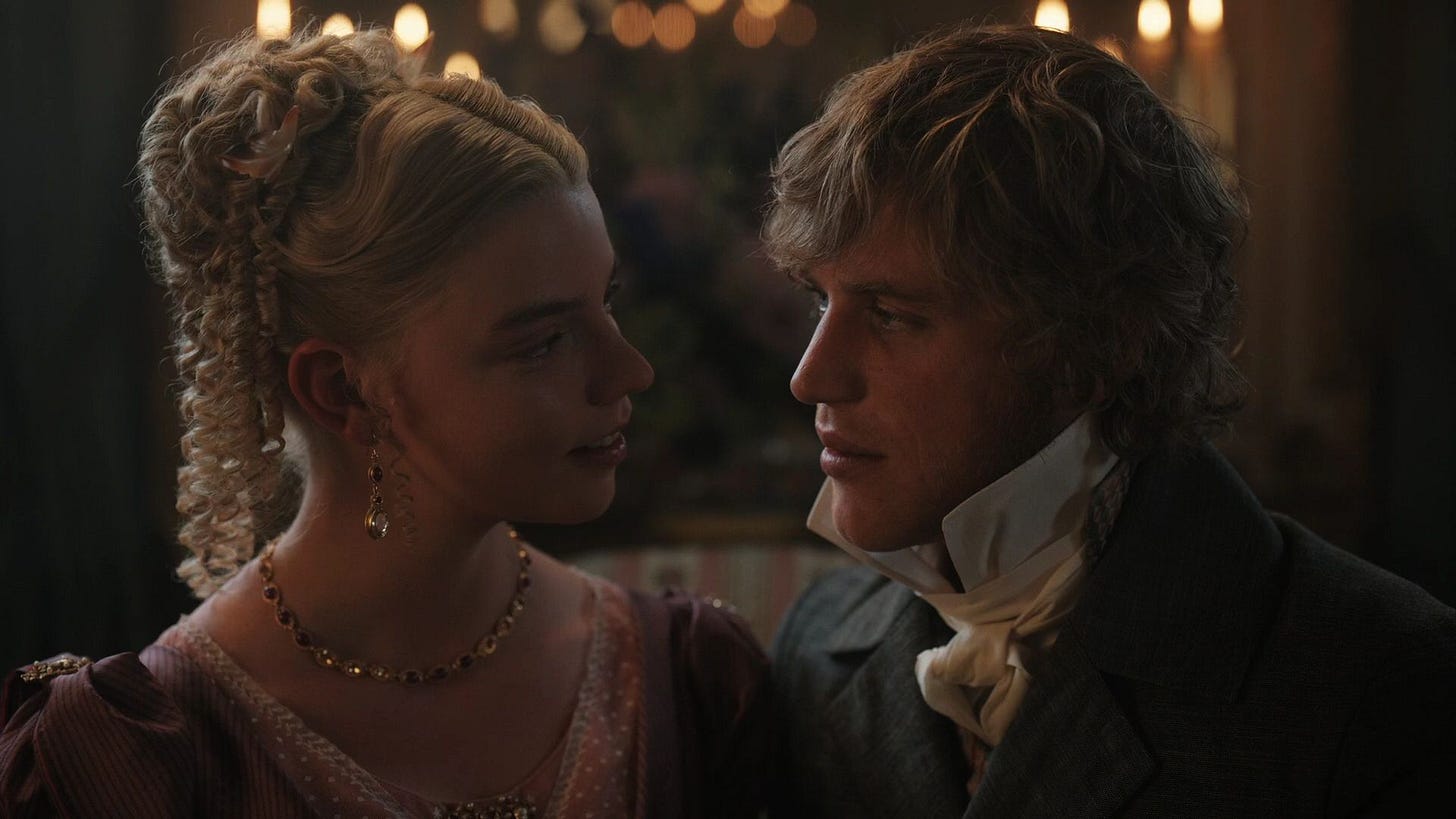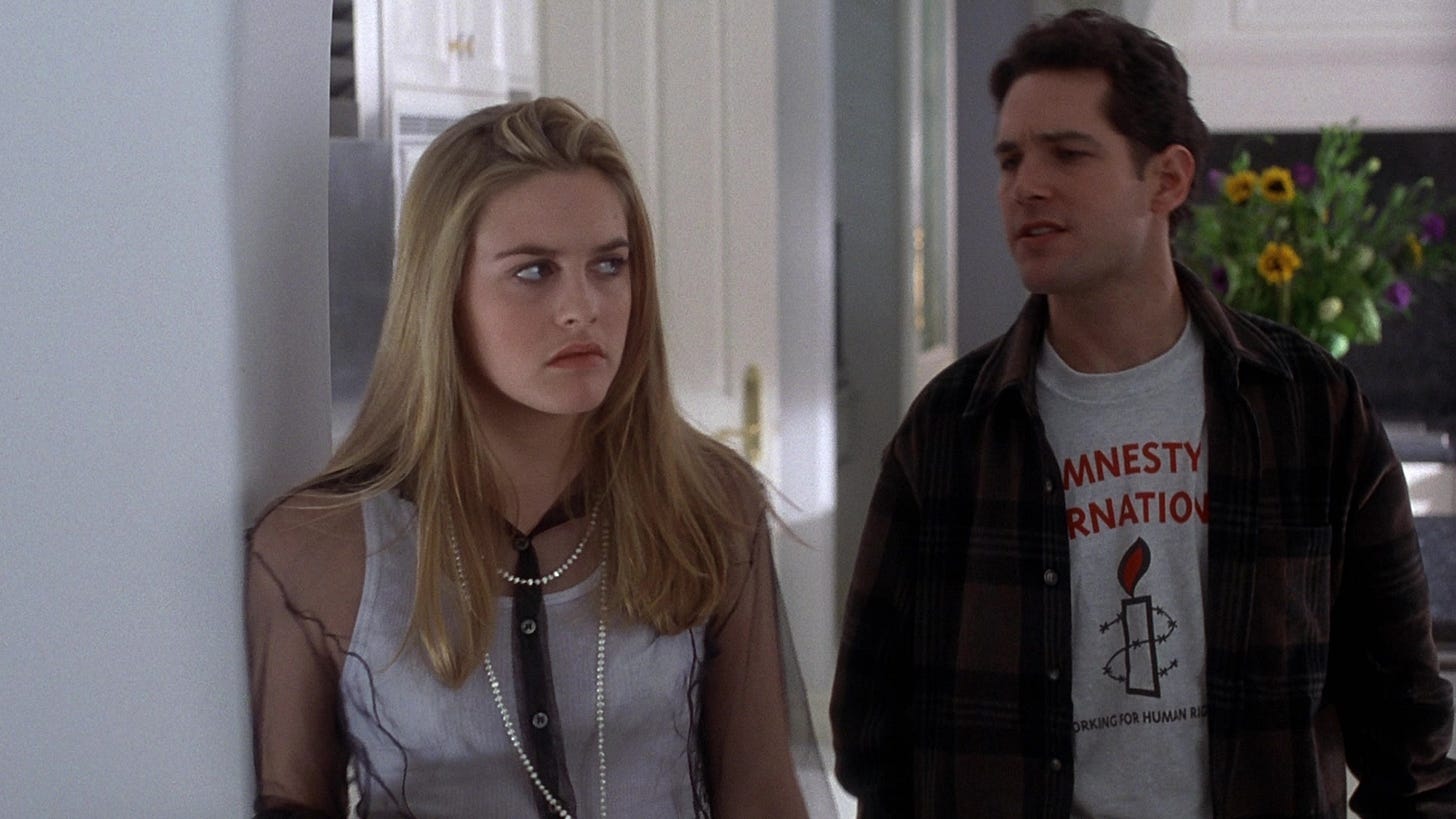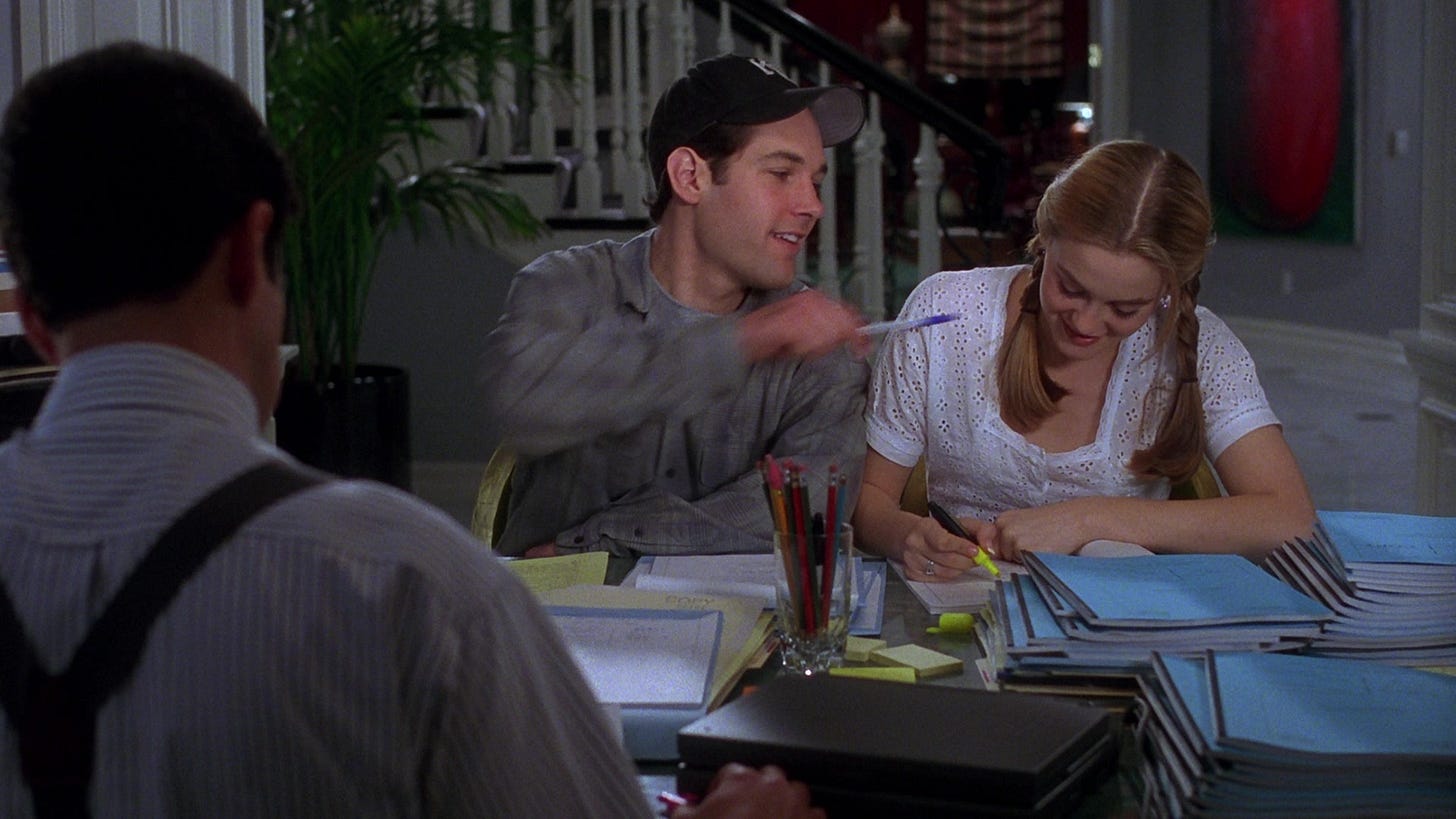Romantic comedies, or romcoms, have been a source of debate in American feminist commentary for as long as I can remember. I was born in the 90s, at the peak of the romcom era of cinema, and my self-proclaimed feminist1 mother spent just as much time watching romcoms as she did criticizing them. Perhaps the defining characteristic of white, privileged feminists who focus primarily on socio-cultural models of gender in media is a paradoxical love for the things they are criticizing. Often I find women resent that they like or aspire to certain tropes, trends, or ideals, which in turn fuels their disdain.2 They want it, and they hate themselves for wanting it. The rational and irrational minds at war with one another.3 In effect, romcoms have been the target of countless critical think pieces, university WGS papers, and substack essays (like this one), most of which portray romcoms as a microcosm of all that is wrong with American media’s portrayal of idealized womanhood and femininity. In my opinion, most of the authors suffer from a fundamental lack of self-awareness. In effect, they often project onto the topic, feel it as something more deeply personal than it was ever intended to be, thus they take it too seriously. On this blog especially, my goal is always to look at gender in media in a light hearted way. I should mention that I have no problem with analyzing gender and sexuality representation in anything and everything. I love to (over)analyze this shit; it’s fun and I can’t help but do it while watching stuff anyways. I do take issue with so many writers scapegoating romcoms, blaming lifelong gendered conditioning on movies like Pretty Woman.
One major criticism of romantic comedies is their frequent utilization of tropes which, outside of a movie, would be considered sexual harassment.4 A lot of people tend to think romcoms normalize these behaviors from men, representing them as acts of love rather than abuse. Articles like this one in The Atlantic5 tie romantic comedy tropes to trends of sexual violence. This makes very little sense to me, as sexual violence didn’t see any kind of spike during the romantic comedy era as far as I can tell. There is a certain kind of obtuseness in hypotheses such as these, or at the very least naïveté.
For clarity, I want to take a moment to discuss romcoms as genre films. Genre films are movies that are made in the image of a genre standard, making them predictable and easy to digest. Genre films in general are considered a lower form of art than high cinema and are usually ignored entirely by the arbiters of good taste, such as the Academy of Motion Picture Arts and Sciences regardless of their quality.6 Certain types of genre films are more clearly defined than others. Horror films, for example, are almost always considered genre films. Elevated or otherwise, a modern horror film is not going to be seen as Oscar-worthy, regardless of audience and even critical reception.7 Action films similarly find very little recognition, and are instead often considered the entertainment equivalent of junk food.8 In contrast, “buddy comedy” movies tend to be considered genre films, though they are not necessarily barred from seeing some success during awards season. Genre films very often employ tropes from a familiar catalog, those which define the genre and are familiar to existing fans. Slashers are a very clear example of this, being so formulaic that most modern slashers bring attention to their use or subversion of these classic tropes. At this point self-awareness and lampshading9 are slasher tropes in themselves.10
Romantic comedies are a form of genre fiction. When you watch a movie that is categorized a romcom, you know exactly what to expect. Lots of tropes can be identified in romcoms, utilized often though not always including friends-to-lovers11, enemies-to-lovers12, fake relationships,13 mistaken for cheating14, the bet,15 etc. The basic plot structure is obvious: two people are shown to the audience, clearly meant to be together, several obstacles are put in their path, and they end up together in the end.16 Sometimes they have a moment of normalcy in the middle of the movie, which is complicated by unresolved miscommunication or deception, only to have one party win the other back through a big romantic gesture. Sometimes, they don’t end up together until the very last moment. Either way, you basically know what you’re in for when you watch a romcom.
Now, the part of this definition that I think is most crucial in the dismantling of the argument that romantic comedies glorify dangerous and offensive behaviors (usually in men) is the fact that at the beginning of (and throughout) any romantic comedy, the audience knows the two love interests will end up together. Therefore, consent, for lack of a better term, is implied in the characters. Of course they will be receptive to grand gestures of love, they’re made for each other, literally. She does want him, she will be ok with this because she was written that way. Is this a good thing? Idk, but it doesn’t really matter. My point is that when someone claims the male character couldn’t have known his female counterpart would be receptive to behavior that in real life would be clearly sexual harassment, the critic is ignoring genre conventions and underestimating the intelligence of the audience for these movies in service to their own point. It’s a cheap shot.
Beyond arguing the rather extreme point that romantic comedies endorse sexual violence, these writers often walk their statements back to conclude that romantic comedies at the very least enforce misogynistic and mainstream standards of femininity, especially in dating or relationships. It is certainly a fair criticism of romantic comedies that they are overwhelming white, cis, heteronormative. It should be noted this is not specific to the genre necessarily, as films made outside those bounds are considered niche, even long after the reign of romcoms has ended. I would argue, however, that these gender roles are so traditional simply because of the staying power of romantic comedy plots. Some of the most memorable and beloved romantic comedies originate in the works of Shakespeare17 and Jane Austen.18 Romantic comedies have existed for a long time, thus the conclusion of many of these stories is a return to traditional gender roles.
A major argument from critics is that heroines of romcoms tend to be ultimately passive while their masculine romantic interests are active. She waits on him to love her, and ultimately ends up settling down to be relatively submissive to her romantic interest in the end. I’ll be honest..I don’t really see this. It happens,19 certainly, but I don’t think it is the norm. Perhaps in romance movies, those not of the comedy variety, it is more common (see: Hallmark Christmas Movies where the working woman settles down to a quaint small town life with some lumberjack who values family and Christmas spirit).
In contrast to popular feminist criticism of romcoms, I believe the genre is more interested in policing masculinity than it is femininity. These movies are made for women, and as such they tend to spend less time criticizing the female love interest than the male one. He often needs to grow up,20 stop sleeping around,21 believe in true love,22 settle down,23 wife her up,24 etc., hence the big declaration of love wherein the man surrenders finally to the woman he has chosen to commit to and the romantic love which she represents. It’s about embracing the parts of masculinity that are complementary to femininity and heteronormative ideals of relationships, while rejecting those which are counter to making a life with one woman. Again, I’m not saying these are good or bad; I’m just describing the pattern I see, and I don’t think these films oppress women any more than they oppress men.
A much more surface level critique of gender stereotypes in romcoms comes from criticism of men tending to be wealthier and more powerful than the woman in these stories.25 To me, this idea misunderstands the fantasy that romcoms often represent, for women especially. The idea of being “saved” by a man is often detestable to these writers, and I understand why. Not 20 years ago, white feminism focused almost entirely on the idea that female empowerment is exemplified by successful, independent women who needed neither romantic fulfillment, nor the aid of men to be “valid.” Having a full time job, being a working mother who could take care of herself and her kids, these were markers of success against the odds; women doing everything they were raised to believe was out of reach. And…sure, yeah, I mean, I don’t think a woman only starts existing once she’s in a relationship. I think women are complete people without husbands or children. I can appreciate that this was not necessarily considered a universal truth until relatively recently. However, I think “lean-in” feminism, the kind obsessed with capitalist ideals of success via wealth and power, is not necessarily the path to feminine enlightenment and emancipation.
This article focuses entirely on the way that romantic comedies have conditioned women to believe it’s normal for men’s careers to be “better” than women’s. In it she includes a chart26:

Now, look, I kind of get what she’s saying, I guess. Men tend to have more power and mobility than women in these stories, but I would argue that is because they are meant to reflect at least some realistic elements of life as a woman. For many women, especially in the 90s, the men they met had better jobs and higher salaries. This is simply the truth, and it is reflected throughout the media at the time. I don’t believe the romcom genre celebrated this to any great degree.
This author goes on to complain that she found herself that emulating the women in romcoms who were employed as writers and editors, and eventually she found that those jobs were less profitable in reality than in these movies. This is puzzling to me, as she seems to be complaining that these movies showed a fantasy of women being better off than they actually were in the real world, which contradicts her original point that romantic comedies tend to show women in disenfranchised economic positions in comparison to their male love interests.
What this person is failing to account for is fantasy. Romantic comedies are fantasies for women, similar to how action movies are for men.27 In romcoms, the protagonist’s problems are often solved with the resolution of the romantic arc, and often this means her love interest solves her problems for her one way or another. If at the beginning of the film, the female character finds herself in financial trouble, he will help her with money or finding a job or a place to live. He will be the solution. He will “save” her. This isn’t necessarily because the movie is suggesting that finding a man will solve a woman’s problems altogether, but instead represents the fantasy that one’s problems could all be so easily solved. Is it really all that ridiculous that an unhappily single woman with money problems wants to meet a man who’s smart, funny, into her, and who happens to be rich?
Moreover, the author’s belief that women should want to pursue the “American dream” or financial success via a corporate career is misguided. Success should not be relegated to any one area of one’s life. For a long time, movies have chided workaholic men because they didn’t spend enough time with their families.28 Are they suggesting the key to happiness is a woman? Yes, I suppose, to some degree. Focusing on success as something achieved outside of the workplace and instead in the bonds of family and love is not a bad thing in my opinion, though it is more in line with traditional gender roles when applied to women.29
Both authors I’ve referenced criticize romantic comedies for ruining their own expectations towards dating and relationships, and this is probably one of the major criticisms I hear from women of the genre. I totally see where they’re coming from. I myself was raised on movies and tv. With divorced parents, my role models of relationships came largely from media, which is obviously skewed towards these idealized portrayals of dating and romance. But I’m not sure it’s fair to blame Bridget Jones’s Diary for my relationship woes. Should movies be created just to create good examples for children? As an adult, escapist cinema is a godsend, and I don’t want to see morality tales for children played off as PG-13 romcoms just in case some latch-key kid somewhere watches it in 5 years on TBS after school.
Overall, I think romantic comedies get a bad rep, often because there is a basic misunderstanding of the purpose of the genre, which is for the viewer to get a happy ending. If I had to identify a gender-related issue that applies specifically30 to romcoms, it would be in the reception of the genre rather than the production of it. I discussed earlier the ways romcoms are categorized as genre films and subsequently dismissed. It could be argued that has to do with their feminine alignment, but I think action movies, largely produced to satisfy men, are similarly disregarded as bad films with cheap thrills. However, I do find it interesting that many movies are considered romcoms simply because they are a comedy wherein the female protagonist gets a boyfriend, but comedies starring men, even those with a romcom structure, are considered straight comedies.31 Most Judd Apatow movies are straightforward romcoms, but are hailed as parts of the comedy cannon as opposed to genre films. The same applies to Adam Sandler movies, which aren’t considered romcoms but are treated with similar disdain by critics for their overall stupidity. Sex comedies in general, American Pie for example, though gendered as men’s movies, are watched by men and women alike. In contrast, many straightforward comedies, some of which are used in the chart above, are dismissed as dumb romcoms including Legally Blonde, Bring it On, Clueless, Miss Congeniality, etc. Furthermore, multiple true romcoms are some of my favorite comedies, full stop, but many men I know haven’t seen them because they were classified as chick flicks, see You’ve Got Mail or Something’s Gotta Give.
I think maybe as women who believe in our own autonomy, we should stop being so worried about why we like something and what that might mean about our psyche and start having fun watching movies that make us all smiley at the end.
Here’s some links to articles that made my blood boil, if you’re interested:
I Just Watched You’ve Got Mail for the First Time and You Guys, It’s Bad
5 Reasons Why Romantic Comedies are Bad for You
Here’s an article that I found after I wrote this one that is on the same page, and I’m glad to see it:
questionable lol
I’ve noticed this predominantly in Millennials+, likely because the younger generations did not grow up in a romcom saturated media-scape, though there is a general rejection of these relatively old movies which can be observed on sites like letterboxd. Reviews for You’ve Got Mail read along the lines of “I can’t believe I’m supposed to like this guy?? He’s awful!”
If I had the time, energy, motivation, and most importantly didn’t have a migraine, I might look into the philosophical and psychoanalytic viewpoint here, but I don’t have it in me at the second.
stalking, persistence, ignoring a no, etc.
12ft.io is a ladder if you need some help over the paywall
https://tvovermind.com/exactly-genre-movie-anyway/
see Hereditary, Midsommar, The VVitch.
Genre films are my favorite type of film, and I would argue that traditional “oscar bait” is its own brand of genre film which has been defined as the “good kind” inadvertently, but thats a different essay.
https://tvtropes.org/pmwiki/pmwiki.php/Main/LampshadeHanging
See Cabin in the Woods, Scream, etc.
When Harry Met Sally, 13 Going on 30, Love & Basketball
You’ve Got Mail, Bridget Jones’s Diary, Sweet Home Alabama, The Proposal, 10 Things I Hate About You, Two Weeks Notice
The Proposal, While You Were Sleeping, The Wedding Date, Drive Me Crazy, Pretty Woman
No Strings Attached
How to Lose a Guy in 10 Days, She’s All That, Cruel Intentions/Dangerous Liasons
I like to view this as the audience seeing the two love interests, and being excited to see how exactly they will get around their differences/obstacles, like a heist movie lol
Much Ado About Nothing, Taming of the Shrew, Twelfth Night
Pride and Prejudice, Emma
Fever Pitch (to an extent), You’ve Got Mail; both of these are weak examples because they tend to, at least nominally, retain the more “fiery” and individualistic sides of themselves, though they do concede some of their stubborn independence in the end
Knocked Up
Crazy Stupid Love
27 Dresses
Hitch
Jerry Maguire, For Love of the Game
https://medium.com/athena-talks/youve-got-male-how-rom-coms-have-secretly-been-holding-women-back-ab1132102fb
I can, and will, rant about this chart forever, but not in the middle of this article. Here it is
Notably, it is easier to see that action movies are fantasies because they are much more outlandish in setting and the ability of the characters, nonetheless, the idea of being a girl who is beautiful and smart (but has no idea that she is) and finding herself suddenly romanced by the perfect guy, is outside the realm of possibility for 99% of people.
Elf, Santa Clause, 99% of all Christmas movies about dads…
I think it’s more likely that things will improve if everyone becomes more “feminine” as opposed to women leaning into the toxic capitalist notion of financial success as markers of personal success, a more traditionally “masculine” pursuit.
Yes the women are all white and young and skinny, this is a problem in most mainstream media.
Other examples include Wedding Crashers, Scott Pilgrim vs The World,

